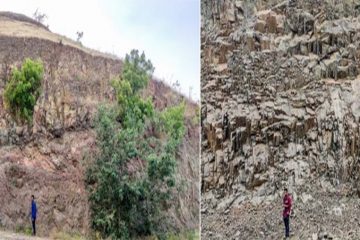 “Be the change you wish to see in the world.”
“Be the change you wish to see in the world.”
These prophetic words of Mahatma Gandhi aptly sum up the deliberations on the World Environment Day on June 5 at IIT Kharagpur. On the day, a panel discussion organized by Vision Prabaho, the eco-conservation forum of IIT Kharagpur, brought together professionals from different walks of life to talk on ‘Environment Vs Development: from confliction to sustainable coexistence’. There was Ms. Nadira Patheriya, Former Judge, Calcutta High Court, Mr. Satyajit Roy, WBFS, Directorate of Forest, Govt. of West Bengal, Prof. Somnath Ghosal, Rural Development Centre, IIT Kharagpur, Prof. Saamdu Chetri, Rekhi Centre of Excellence for the Science of Happiness, and former Executive Director, Gross National Happiness Centre, Bhutan, and Mr. Rohit Kishan Ray, Research Scholar, Physics Department, IIT Kharagpur.

Mr. Satyajit Roy explained how aggressive development in different parts of the country was destroying its wildlife, eg. the Great Indian Bustard of Rajasthan or the Fishing Cat of the Sunderbans. “How much land should go for development? How much forest should we preserve? The forest department often has to balance both the priorities,” said Mr. Roy. He also pointed out how the involvement of the local communities in conservation efforts, government programs such as Van Mahotsav, and even state schemes, were helping to turn the tide. In fact, there has been a marginal increase in the forest cover in India.
“The Nature does not need us, but we need Nature,” said Prof. Chetri, who powerfully advocated education on environmental matters from a very young age, the dropping of meat and packaged food from our diet. “If we stopped eating meat and dairy products, there would be a lot of land for planting trees,” he said. He also argued that packaged food was benefiting no one else but the multinational companies. He cited the case of Bhutan, which used only 39 per cent of its ‘Natural capital’, and made local communities responsible for the upkeep of the environment. In many areas of Bhutan, the biodiversity had improved and the water system had regenerated as a result, he said.
 Ms. Nadira Patheriya did not agree with Prof. Chetri on radical solutions, such as dictating the change of diet, but she stressed on the use of environmentally-friendly materials in exchange of plastics. “I look at plastics and I feel angry. What have we done?” she said. She was happy at seeing corn flour being used to make the small packets for the ‘prasad’ distributed at Golden Temple of Amritsar. “Even for paper bags, we cut down trees. Why not make jute bags, which would also bring in revenue?”
Ms. Nadira Patheriya did not agree with Prof. Chetri on radical solutions, such as dictating the change of diet, but she stressed on the use of environmentally-friendly materials in exchange of plastics. “I look at plastics and I feel angry. What have we done?” she said. She was happy at seeing corn flour being used to make the small packets for the ‘prasad’ distributed at Golden Temple of Amritsar. “Even for paper bags, we cut down trees. Why not make jute bags, which would also bring in revenue?”
Prof. Somnath Ghoshal said he did not see any conflict between ‘Environment’ and ‘Development’, but of course, there is a conflict between ‘Healthy environment’ and ‘Careless Development’. He emphasized on the need to look at the ‘inner environment’ of each individual as well because “the art of living, or how I live, what I nurture’ has an indelible impact on the environment.
 Rohit Kishan Ray stressed on the need to run a “propaganda” on a war footing to make people aware of the environmental disaster awaiting us if we continued in our ways. Recent political developments had convinced him how fear could be used to influence opinion. “People had to be convinced that they need to save themselves, not Nature… the ‘threat’ was to their own existence.”
Rohit Kishan Ray stressed on the need to run a “propaganda” on a war footing to make people aware of the environmental disaster awaiting us if we continued in our ways. Recent political developments had convinced him how fear could be used to influence opinion. “People had to be convinced that they need to save themselves, not Nature… the ‘threat’ was to their own existence.”
Moderated by Prof. Sudha Goel, Civil Engineering; Environment Science and Engineering, each speaker stressed on the importance of taking small individual steps to bring about change. In this context, it would be relevant to mention how Vision Prabaho has been campaigning against the use of plastic in IIT Kharagpur. The group observed Earth Day with its program for “Un-nailing Trees”, whereby trees on both sides of a 500 metre road were freed of nails and other contraptions.
 “Our foremost aim is to spread awareness regarding the importance of tree conservation, reducing the carbon print and encouraging the student community in plantation drives which is crucial to the sustenance of life on earth,” says a group member. Vision Prabaho, which is also mentored by Mrs. Barnali Chakrabarti, botanist and wife of the Director, Prof. Partha Pratim Chakrabarti, observed World Environment Day 2018 with a “Green Talk” featuring Prof. Souvik Bhattacharya, Vice-Chancellor, BITS Pilani among other green activists and thinkers.
“Our foremost aim is to spread awareness regarding the importance of tree conservation, reducing the carbon print and encouraging the student community in plantation drives which is crucial to the sustenance of life on earth,” says a group member. Vision Prabaho, which is also mentored by Mrs. Barnali Chakrabarti, botanist and wife of the Director, Prof. Partha Pratim Chakrabarti, observed World Environment Day 2018 with a “Green Talk” featuring Prof. Souvik Bhattacharya, Vice-Chancellor, BITS Pilani among other green activists and thinkers.
Pictures: Vision Prabaho



